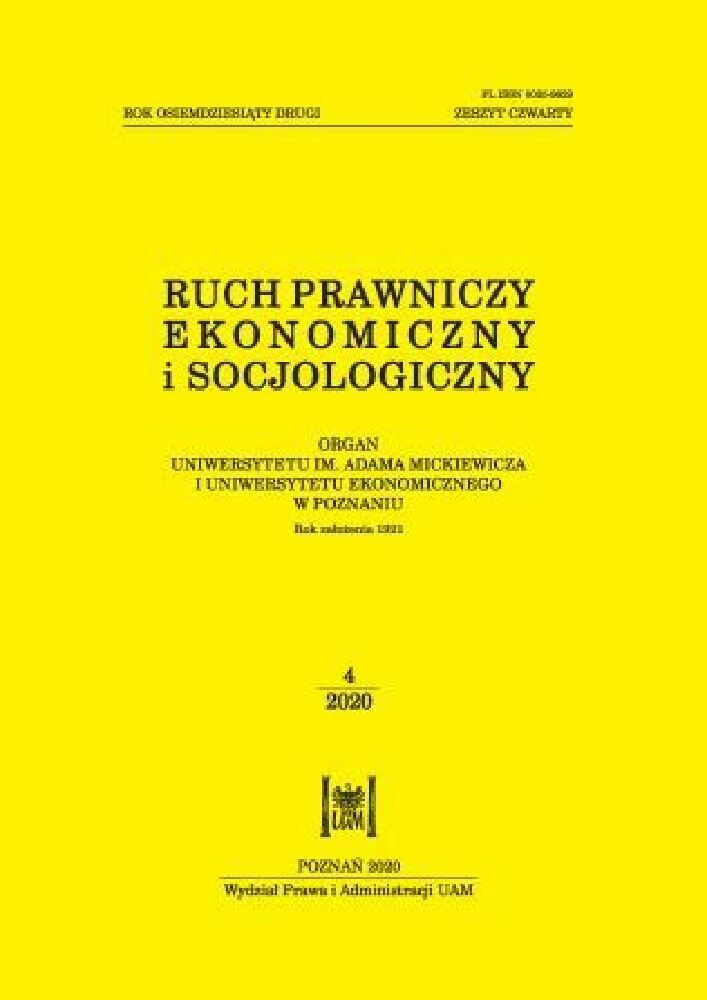Abstrakt
In 1980, in Poland, there were about 30 religious minorities. The socio-political transformation changed the religious landscape dramatically. In 1999, there were already 155. Not all new religions, however, were registered. In the case of The Church of Miracles, The Raelians, and The Order of Initiated Knighthood, registration was refused. The Ministry of the Interior and the Supreme Administrative Court decided that they did not fulfil the requirements of a “religion”. The purpose of this article is to examine, from a sociological perspective, the definitions of religion used by the court, by which the above new religious movements were not recognised as religions. The analysis shows that the court and administration ruled on the basis of substantial definitions of religion, reducing religion to believing in God or the sacred. Furthermore, the article presents the socio-cultural reasons behind the choice of such definitions, and reviews the scholarly debate on the issue.
Bibliografia
Barker, E. (2015). New religious movements, [in:] J.D. Wright (ed.), International Encyclopedia of the Social & Behavioral Sciences. Second edition. Vol. 16. Amsterdam: 805–808.
Barker, E. (1997). Nowe ruchy religijne. Tłum. T. Kunz. Cracow.
Beckford, J.A. (1999). The politics of defining religion in secular society. from a taken-for-granted institution to a contested resource, [in:] J.G. Platvoet, A.L. Molendijk (eds.), The Pragmatics of Defining Religion: Contexts, Concepts and Contests. Leiden: 23–40.
Beckford, J.A. (2003). Social Theory and Religion. Cambridge.
Berger, P.L. (1973). The Social Reality of Religion. Harmondsworth.
Beźnic, S. (1997). Przegląd nowych ruchów religijnych w Polsce, [in:] E. Barker, Nowe ruchy religijne. Tłum. T. Kunz.Cracow: 251–339.
Bieńkuńska, A., Ciecieląg, P., Góralczyk, A., Gudaszewski, G., Piasecki, T., Ks. Sadłoń, W. (2019). Wyznania religijne w Polsce w latach 2015–2018. Warsaw.
Borowik, I. (2017). Religion in Poland between tradition and modernity, or religious continuity and change in conditions of transformation, [in:] S. Ramet, I. Borowik (eds.), Religion, Politics, and Values in Poland: Continuity and Change Since 1989. New York: 185–208.
Bruce, S. (2011). Defining religion: a practical response. International Review of Sociology – Revue Internationale de Sociologie 21(1): 107–120.
Chryssides, G. (2006). Raëlian Church, [in:] P.B. Clarke (ed.), Encyclopedia of New Religious Movements. London: 509–511.
Dobbelaere, K., Lauwers, J. (1973). Definition of religion – a sociological critique. Social Compass 20(4): 535–551.
Donovan, J.M. (1995). God is as God does: law, anthropology, and the definition of ‘religion’. Seton Hall Constitutional Law Journal, 6(1): 23–99.
Geertz, C. (1966). Religion as a cultural system, [in:] M. Banton (ed.), Anthropological Approaches to the Study of Religion. London: 1–46.
Goldberger, G., Hall, D., Grešková, L., Smoczyński, R. (2010). Societal reactions to new religious movements in Poland, Croatia and Slovakia, [in:] D. Hall, R. Smoczyński (eds.), New Religious Movements and Conflict in Selected Countries of Central Europe, Warsaw: 29–94.
Hall, D., Smoczyński, R. (2010). Introduction, [in:] D. Hall, R. Smoczyński (eds.), New Religious Movements and Conflict in Selected Countries of Central Europe, Warsaw: 7–28.
Introvigne, M. (1999). Religion as claim: social and legal controversies, [in:] J.G. Platvoet, A.L. Molendijk (eds.), The Pragmatics of Defining Religion: Contexts, Concepts and Contests. Leiden: 41–72.
Kehrer, G. (1997). Wprowadzenie do socjologii religii. Tłum. J. Piegza. Cracow.
Luckmann, T. (1967). The Invisible Religion: The Problem of Religion in Modern Society. New York.
Mcguire, M.B. (2002). Religion: The Social Context. Belmont, CA.
Mikulska, A. (2002). Wolność sumienia i wyznania: Raport z monitoringu. Warsaw.
Ministerstwo Spraw Wewnętrznych i Administracji, Międzyresortowy Zespół do Spraw Nowych Ruchów Religijnych (2000). Raport o niektórych zjawiskach związanych z działalnością sekt w Polsce. Warsaw.
Pasek, Z. (2000). Problem definicji religii a nowe ruchy religijne: Uwagi na podstawie sytuacji współczesnej Polski. Nomos 30/31: 27–38.
Pasek, Z. (2005). Ugrupowania religijnego pogranicza, [in:] W. Nowak, S. Ropiak (eds.), Sekty jako wyzwanie społeczne i religijne. Olsztyn: 79–88.
Pawluczuk, W. (2002). Socjologia pojęcia “religia”, [in:] M. Karas (ed.), Definicja religii. Studia i szkice. Cracow: 123–128.
Polski Ruch Raeliański. (1997a). Podstawowe założenia doktrynalne [Basic Doctrine Theses].
Unpublished. Submitted to the MSWiA.
Polski Ruch Raeliański. (1997b). Uzupełnienie podstawowych założeń doktrynalnych [Supplementary Basic Doctrine Theses]. Unpublished. Submitted to the MSWiA.
Yinger, M.J. (1970). The Scientific Study of Religion. New York.
Zakon Wtajemniczonego Rycerstwa Linii Spiralnego Pierścienia – Entathmiadormia. (1998a). Tezy Doktrynalne Entathmiadormii [Doctrine Theses of Entathmiadormia]. Unpublished. Submitted to the MSWiA.
Licencja
Prawa autorskie (c) 2020 WPiA UAM

Utwór dostępny jest na licencji Creative Commons Uznanie autorstwa – Użycie niekomercyjne – Bez utworów zależnych 4.0 Międzynarodowe.





